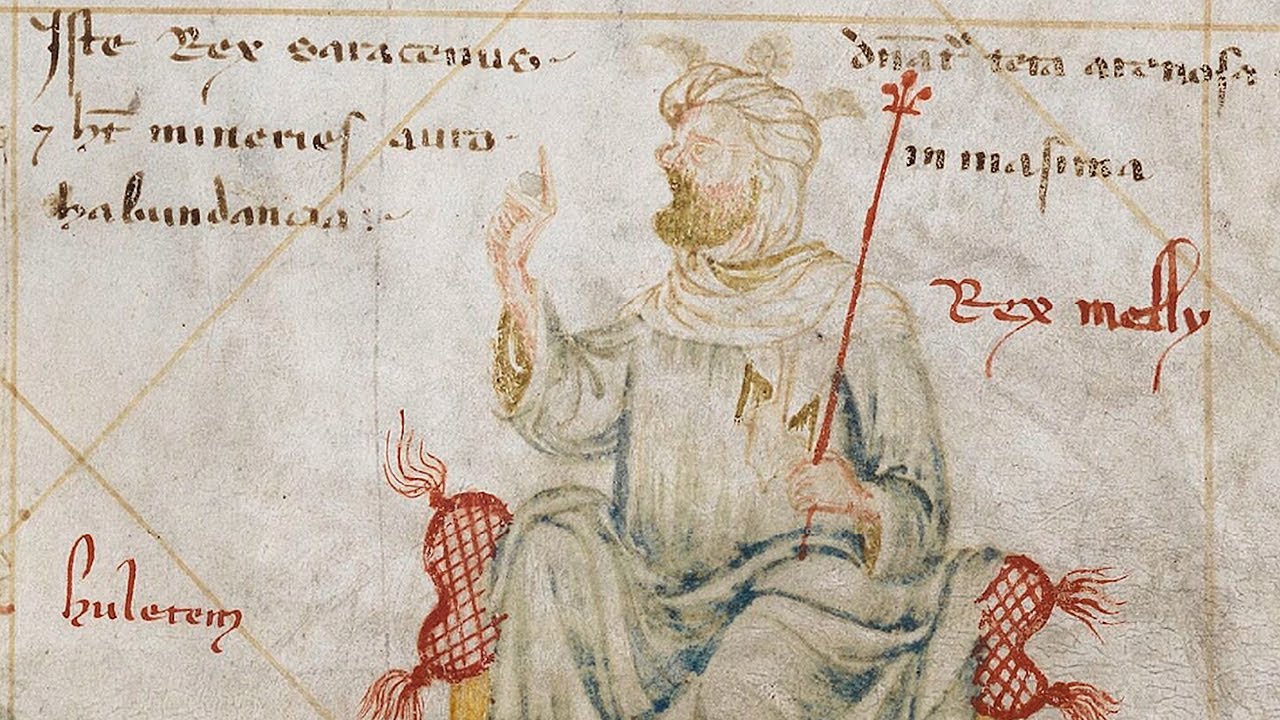Musa I of Mali: The Real Life King Midas
Summary
TLDRThis video explores the life and legacy of Mansa Musa I, the 14th-century ruler of the Mali Empire, renowned for his immense wealth and transformative impact on West Africa. Musa’s legendary pilgrimage to Mecca in 1324 showcased his riches, contributing to his mythic status. However, his reign also faced challenges, including succession disputes that led to civil war and the eventual decline of the empire. Despite its fragmentation, Musa's patronage of culture and learning left an enduring legacy, making Timbuktu a symbol of knowledge and wealth. His story highlights the rich history of African leadership and influence.
Takeaways
- 👑 Musa I of Mali was an incredibly wealthy ruler, often regarded as the richest person in history.
- 🗓️ His reign marked the height of the Mali Empire, which flourished in trade and culture.
- ⚔️ After Musa's death in 1337, a succession crisis ensued due to a lack of established laws for inheritance.
- 🔥 The resulting civil wars and rebellions fragmented the once-mighty empire into various provinces.
- 📉 The Malian Empire's decline was accelerated by the discovery of new gold fields and trade routes, leading to reduced taxes and income.
- 🚩 The Songhai Kingdom, initially a subordinate power, gained independence and eventually conquered Mali by 1464.
- 🏴☠️ The Songhai's conquest involved multiple sackings of Timbuktu, diminishing its historical significance.
- 🗺️ Musa I's legacy was immortalized in maps created by explorers who were inspired by tales of his wealth.
- 🌟 Timbuktu became a legendary symbol of wealth and knowledge, shaping European perceptions of Africa for centuries.
- 💰 Musa I's story serves as a reminder of the transient nature of power and wealth, contrasting with modern billionaires.
Q & A
Who was Mansa Musa, and what was his significance in history?
-Mansa Musa was the ninth emperor of the Mali Empire, known for his immense wealth, which derived largely from the empire's gold resources. He is significant for transforming Mali into a prosperous and influential center of trade and culture in West Africa during the 14th century.
What event is Mansa Musa famously known for during his pilgrimage to Mecca?
-During his pilgrimage to Mecca in 1324, Mansa Musa famously displayed his wealth by traveling with a caravan of thousands of people and camels, laden with gold. His lavish spending along the route was said to have disrupted local economies.
What architectural contributions did Mansa Musa make to Timbuktu?
-Mansa Musa is credited with commissioning the construction of several significant structures in Timbuktu, including the Djinguereber Mosque, which became a symbol of the city’s wealth and learning.
How did Mansa Musa's reign impact the spread of Islam in West Africa?
-Mansa Musa's reign significantly promoted the spread of Islam in West Africa. His pilgrimage highlighted the importance of Islam, and he encouraged its practice through the establishment of mosques and centers of learning, transforming Timbuktu into a major Islamic educational center.
What internal challenges did the Mali Empire face after Mansa Musa's death?
-After Mansa Musa's death in 1337, the Mali Empire faced challenges such as a lack of a clear succession plan, leading to civil wars and disputes over the throne. This resulted in the fragmentation of the empire and the rise of provincial rebellions.
What external factors contributed to the decline of the Mali Empire?
-The discovery of new gold fields and the opening of alternative trade routes in the mid-15th century drained resources and taxes from Mali, contributing to its decline. Additionally, the rise of the powerful Songhai Kingdom further weakened Mali's hold on its territories.
What was the fate of Timbuktu during the decline of the Mali Empire?
-During the decline of the Mali Empire, Timbuktu was attacked and ransacked by the Songhai Kingdom several times, leading to the loss of its wealth and cultural heritage, which had been established under Mansa Musa.
How did Mansa Musa's wealth influence European perceptions of Africa?
-Mansa Musa's wealth and the stories surrounding his reign contributed to European perceptions of Africa as a land of vast riches. The Spanish geographer's map featuring Musa inspired tales of Timbuktu as a mythical city paved with gold, shaping exploration narratives in Europe.
What legacy did Mansa Musa leave behind in terms of culture and education?
-Mansa Musa left a lasting legacy in promoting education and culture in West Africa. He supported scholars, attracted intellectuals to Timbuktu, and established it as a center of learning, significantly influencing the region's cultural and educational landscape.
In what ways does Mansa Musa's story challenge modern perceptions of African history?
-Mansa Musa's story challenges modern perceptions of African history by illustrating that African civilizations were rich and complex, with advanced economic, cultural, and educational systems. It counters stereotypes of Africa as lacking civilization and highlights its historical significance.
Outlines

Cette section est réservée aux utilisateurs payants. Améliorez votre compte pour accéder à cette section.
Améliorer maintenantMindmap

Cette section est réservée aux utilisateurs payants. Améliorez votre compte pour accéder à cette section.
Améliorer maintenantKeywords

Cette section est réservée aux utilisateurs payants. Améliorez votre compte pour accéder à cette section.
Améliorer maintenantHighlights

Cette section est réservée aux utilisateurs payants. Améliorez votre compte pour accéder à cette section.
Améliorer maintenantTranscripts

Cette section est réservée aux utilisateurs payants. Améliorez votre compte pour accéder à cette section.
Améliorer maintenantVoir Plus de Vidéos Connexes

Mansa Musa, one of the wealthiest people who ever lived - Jessica Smith

Meet the Richest Man Who Ever Lived

The Spread of Islam in Africa

The TRANS-SAHARAN TRADE Network, Explained [AP World History Review—Unit 2 Topic 4]

The Rise and Fall of the Mali Empire

Mansa Musa and the Mali Empire - ROBERT SEPEHR
5.0 / 5 (0 votes)
